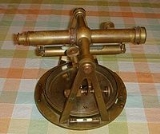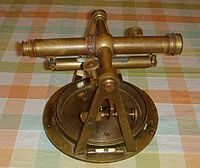
John S. Hougham
Encyclopedia


Purdue University
Purdue University, located in West Lafayette, Indiana, U.S., is the flagship university of the six-campus Purdue University system. Purdue was founded on May 6, 1869, as a land-grant university when the Indiana General Assembly, taking advantage of the Morrill Act, accepted a donation of land and...
first appointed professor, and acting President between the administrations of Abraham C. Shortridge and Emerson E. White.
Hougham first graduated from Wabash College
Wabash College
Wabash College is a small, private, liberal arts college for men, located in Crawfordsville, Indiana. Along with Hampden-Sydney College and Morehouse College, Wabash is one of only three remaining traditional all-men's liberal arts colleges in the United States.-History:Wabash College was founded...
in Crawfordsville, Indiana (1846), then rose to Professor of Mathematics
Mathematics
Mathematics is the study of quantity, space, structure, and change. Mathematicians seek out patterns and formulate new conjectures. Mathematicians resolve the truth or falsity of conjectures by mathematical proofs, which are arguments sufficient to convince other mathematicians of their validity...
and Natural Philosophy
Natural philosophy
Natural philosophy or the philosophy of nature , is a term applied to the study of nature and the physical universe that was dominant before the development of modern science...
at Franklin College in Franklin, Indiana (1848 – 1867). During this time he was also a well regarded maker of scientific instruments (see images, right) for educational and professional use in medicine, chemistry, astronomy, and other related fields (e.g., Solar Compass
Solar compass
The solar compass, an astronomical instrument, was first invented and made by William Austin Burt. He patented it on February 25, 1836, in the United States Patent Office as No 9428X. It received a medal at the Great Exhibition of 1851...
).
After those appointments, he was Chairman of Philosophy and Agriculture at Kansas State University
Kansas State University
Kansas State University, commonly shortened to K-State, is an institution of higher learning located in Manhattan, Kansas, in the United States...
(1868 – 1872). He then took an appointment as Professor of Physics
Physics
Physics is a natural science that involves the study of matter and its motion through spacetime, along with related concepts such as energy and force. More broadly, it is the general analysis of nature, conducted in order to understand how the universe behaves.Physics is one of the oldest academic...
and Industrial Mechanics, and Chairman of Agricultural Chemistry
Agricultural chemistry
Agricultural chemistry is the study of both chemistry and biochemistry which are important in agricultural production, the processing of raw products into foods and beverages, and in environmental monitoring and remediation...
at Purdue University
Purdue University
Purdue University, located in West Lafayette, Indiana, U.S., is the flagship university of the six-campus Purdue University system. Purdue was founded on May 6, 1869, as a land-grant university when the Indiana General Assembly, taking advantage of the Morrill Act, accepted a donation of land and...
(1872 – 1876), serving in those early years of Purdue’s history as an academic "handyman" — and for a time acting President for parts of 1874 and 1876 — to John Purdue
John Purdue
John Purdue was a famous industrialist based in Lafayette, Indiana and the primary original benefactor of Purdue University.-Early life:...
and the founding Trustees, visiting other universities around the country in search of new ideas and faculty to bring back to his native Indiana. Around 1876, he returned to Kansas State where he spent the remaining years of his academic career.
Additional Sources
- Rittenhouse Journal index. Elgin, Richard L. "John S. Hougham and the Early History of the Solar Compass." Rittenhouse: The Journal of the American Scientific Instrument Enterprise 7(28):117-121. Retrieved September 28, 2007
- The Hougham/Huffam Family Tree. "John Scherer Hougham - Developer of the solar compass" by RICHARD L ELGIN, PHD, LS, PE, ELGIN SURVEYING & ENGINEERING, NC.

